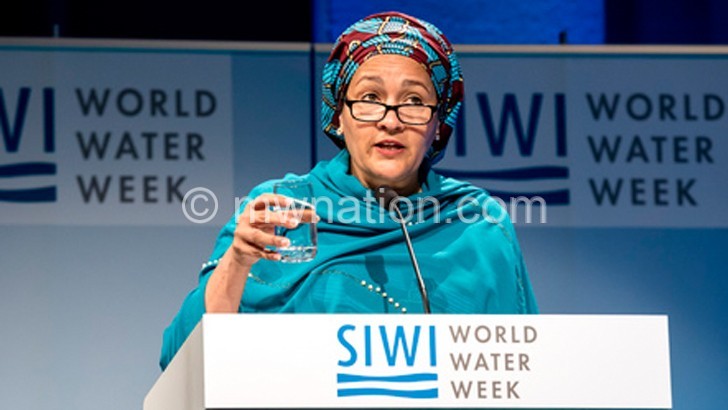‘Time to act water-wise’
The World Water Week got underway in Sweden, on Monday with calls for bold collective action to save water bodies from harsh effects of environmental degradation, climate change and rapid population growth.
Speakers at the official opening of the global conference, which is organised by the Stockholm International Water Institute (Siwi), took turns to demand a sense of urgency to avert water woes.

The United Nations (UN) Deputy Secretary General Amina Mohammed, who spearheads the 2030 Agenda for Sustainable Development, expressed optimism that the world still has enough safe water for humanity.
She challenged almost 3 650 people at the annual conference in Stockholm that it is time to act collectively and turn theory into practice to conserve water sources and the environment for sustainable human development.
“We have the water and we have the policies. This is good news. It is time to take that leap of faith and start implementing, not for our future tomorrow, but for our future today,” she said.
To her, Sustainable Development Goal (SDG) 6 is the “docking of all SDGs”.
Malawians are among sub-Saharan countries hit hard by chronic droughts and unsustainable use of natural resources in southern Africa.
The Ministry of Agriculture, Irrigation and Water Development estimates that nearly 1.9 million families are food insecure due to low maize yield following persistent dry spells in the previous growing season.
Low rainfall has also reduced parts of Lake Chilwa to cracking crusts, worsening hunger and poverty among thousands of farmers, fishers and traders who depend on the lake currently running dry.
In Ntcheu and Balaka districts, almost 58 000 people are haunted by dry taps and long queues for rations of drinking water from a bowser since Mpira Dam run dry due to the climate shocks, deforestation and siltation.
The drying of rivers, dams, lakes and wetlands in the region and beyond could be an early warning of a graver disaster if not kept in check, said Siwi executive director Torgny Holmgren.
“Water scarcity has become the norm in many countries and we might as well be heading for a global crisis unless we work together to conserve water, ecosystems and human development,” he said.
According to Holmgren, the world must act swiftly and sustainably to achieve Sustainable Development Goal (SDG) six-ensuring water for all-as “getting water right” might be a giant step towards achieving all the 17 goals world leaders adopted to end poverty by 2030.
But about two billion people-over a quarter of the global population, have no access to safe water, UN figures show.
The Malawi Demographic and Health Survey indicates that nearly one in 10 people in the country is at risk of contracting preventable diseases association with poor sanitation due to lack of safe water.
Several other speakers in the Swedish capital urged against water pollution, deforestation and other forms of unsustainable use of natural resources which make safe water unattainable both in rural and urban settings.





